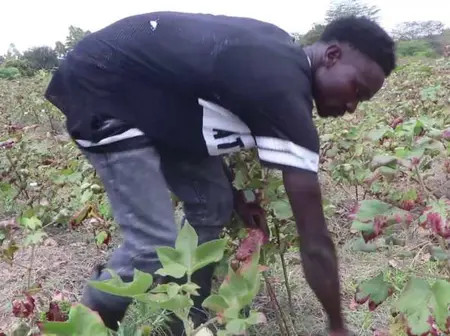When his classmates joined universities across the country this month, 21-year-old Paul Rukwaro from Marondo village, Taveta subcounty in Taita Taveta County was left behind, not because he lacked brains, but because he lacked school fees.
Determined not to let poverty crush his dream of becoming a teacher, the soft-spoken Form Four leaver who scored C+ took an unusual path, he turned to cotton farming.
On his family’s two-acre piece of land, Rukwaro has been tending to rows of cotton plants, and today he is harvesting his first crop. His eyes, though tired from long days in the sun, still beam with hope.
“I want to go to university in Kiambu and train as a teacher,” he said. “But my parents cannot afford the fees. My father gave me land to grow cotton so that I can raise the money myself.”
Rukwaro’s story is a mirror of a silent revolution sweeping across Taita Taveta, where over 100 youths, once frustrated by joblessness and lack of opportunities, have embraced cotton farming.
This comes after the government raised the cotton buying price from Ksh52 to Ksh72 per kilo, a move that has breathed new life into the long-neglected sector.
Recently, Thika Cloth Mills Development Manager Hesmond Olweny toured the area to assess the crop. He praised the young farmers, saying “it is encouraging to see youth enter cotton farming, which for years was dominated by the elderly. This is the future of textile revival in Kenya.”
Olweny confirmed the new price and said that TCM would buy all the cotton. He also encouraged the youths to venture in to other crops as well saying they are the drivers of our economy.
For years, young people in Taita Taveta were locked out of farming by a cultural wall: fathers rarely surrendered land to their children. The practice left the youth idle and disillusioned, watching from the sidelines as farming remained the preserve of their elders.
But now, something is changing. A quiet revolution is taking root in Taveta as parents begin handing over pieces of land to their children, and with it, new hope is sprouting in the form of cotton.
The simple act of parents opening up land to their children is rewriting destinies. Said Olweny. He urged other regions to borrow a leaf from Taveta.
Chausiku Ramadhani who is the Chairperson of Pamba ni Mali Cotton Farmers’ Cooperative Society, which brings together farmers in Taita Taveta, confirmed that youth now form the backbone of her membership.
“I have over 100 young people in the Society, 100 old men and 100 old women making a total of 300 farmers. Young people are leading the way. We thank the government and Thika Cloth Mills textile industry together with other stakeholders for standing with us, giving free seeds, pesticides, and better prices,” she said.
The farmers are currently planting BT cotton, a high-yielding variety and a cameroonean new seed introduced by the government recently. The chairperson noted that BT cotton matures in three months and resists pests, unlike other traditional seeds that takes six months to harvest.
As Rukwaro stacks his harvested cotton into sacks, he remains hopeful. He knows that the money from his crop will not be enough to cover university fees, but he believes in miracles.
“I appeal to well-wishers to add me something small so I can join my classmates in university. I want to study, graduate, and come back to teach the children of Taita Taveta. That is my dream.”
For Rukwaro, each fluffy white ball of cotton is more than a crop, it is a step closer to the classroom where he longs to stand, not as a student, but as a teacher shaping the future of others.
However, he says he would continue growing cotton even while in School

Leave a Reply